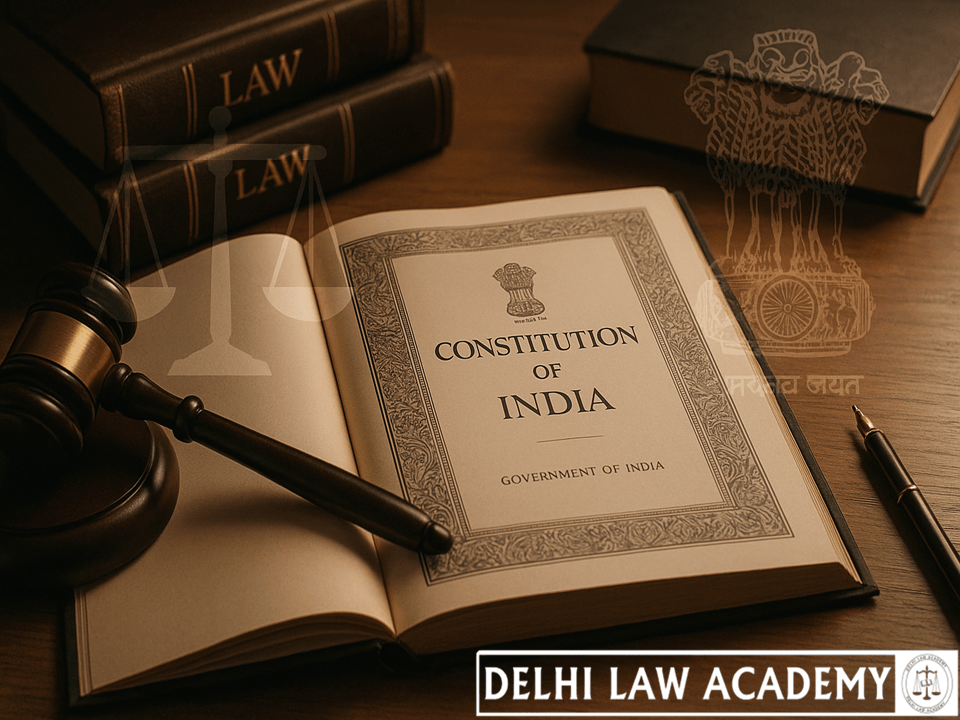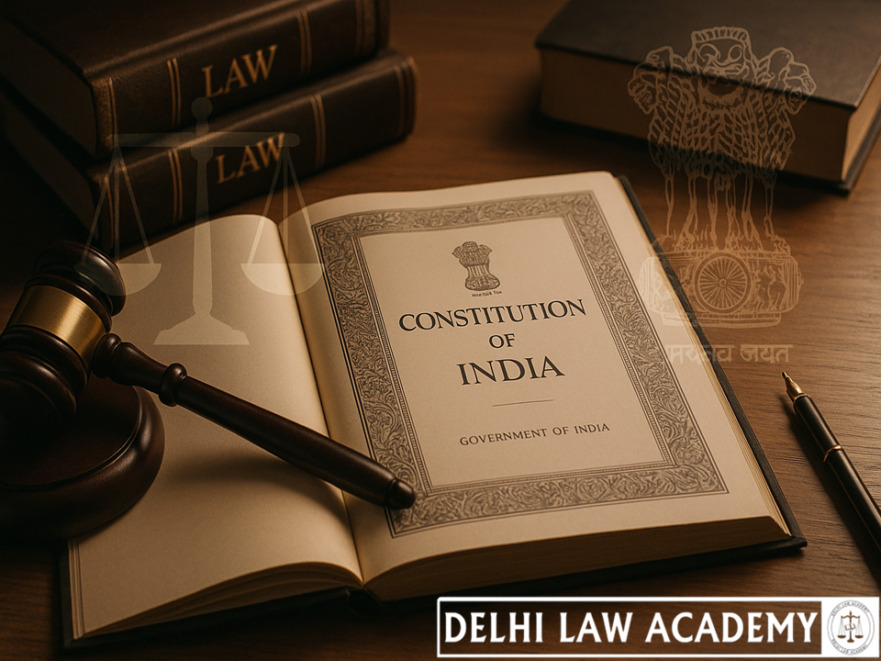
📘 DISTRIBUTION OF LEGISLATIVE POWERS
Articles 245 – 254
Delhi Law Academy Jaipur presents below for aspirants of RJS, DJS, PCS (J) and other Judicial Services throughout India a simplified Note on the Constitutional provisions relating to distribution of legislative powers.
⚖️ Constitutional Provisions
Article 245 Territorial extent • Subject to provisions of this Constitution • Parliament may make laws o for the whole or any part of India • Legislature of a State may make laws o for the whole or any part of State • No law made by Parliament o shall be deemed to be invalid o on the ground that it would have extra-territorial operation Article 246 Subject matter of laws (1) • Parliament has exclusive power o to make laws o on any matter in List I in Seventh Schedule (2) • Parliament and Legislature of a State have power o to make laws o on any matter in List III in Seventh Schedule (3) • Legislature of a State has exclusive power o to make laws for such State or any part o on any matter in List II in Seventh Schedule (4) • Parliament has power o to make laws o on any matter in any List o for any part of India not included in a State Article 246A(1)* • Notwithstanding articles 246 and 254: • Parliament and Legislature of every State o shall have power to make laws o on goods and services tax imposed by the Union or by such State Article 246A (2)* • Parliament has exclusive power to make laws o with respect to goods and services tax o where supply of goods or services takes place o in the course of inter-State trade or commerce Explanation • Provisions of this article o for goods and services tax referred in article 279A(5) o shall take effect o from the date recommended by the Goods and Services Tax Council *Note: • Article 246A has been inserted o by the 101st Amendment Act 2016 Article 247 • Parliament may by law can o provide for establishment of additional courts for better administration of laws made by Parliament or of any existing laws on a matter in Union List Article 248 Residuary Powers of Legislation • Subject to article 246A • Parliament has exclusive power o to make law o on any matter not in Concurrent List or State List • Parliament has exclusive power o to impose any tax o not mentioned in those Lists Article 249 • If Council of States has declared by resolution o by not less than two-thirds of members present and voting • that it is necessary or expedient in national interest • that Parliament should make laws o on goods and services tax (article 246A) or o on a specified matter in State List • Parliament can make laws on that matter o while the resolution is in force • Such resolution shall remain in force for a period specified therein o but not exceeding one year • Such resolution shall continue in force for a further period of one year o if and so often as another resolution approving continuance is passed Temporary Law • A law made under this article o shall cease to have effect o on expiry of six months from the end of resolution Article 250 During Emergency • Parliament shall have power o while Emergency is in operation • to make laws for whole or any part of India o on goods and services tax (article 246A) or o on any matter in State List Temporary Law • A law made under this article o shall cease to operate o on expiry of six months after end of Emergency Article 251 • Articles 249 and 250 shall not restrict power of a State Legislature o to make any law which it otherwise has power to make • If such law is repugnant to a law made by Parliament under these articles • Law made by Parliament shall prevail o whether passed before or after the law made by State Legislature • Law made by State Legislature shall be inoperative o to the extent of repugnancy o but so long only as the law made by Parliament continues to have effect Article 252 • If resolutions are passed by Legislatures of two or more States o that it would be desirable that a matter on which Parliament has no power to make laws for States except under articles 249 and 250 o should be regulated in such States by Parliament • it shall be lawful for Parliament to pass an Act for regulating that matter • Any Act so passed shall apply o to such States and also o to any other State by which it is adopted afterwards by resolution passed by Legislature of that State • Any Act so passed by Parliament o may be amended or repealed by Parliament o but shall not be amended or repealed by State Legislature Article 253 • Notwithstanding anything in this Chapter • Parliament has power to make any law o for implementing any treaty, agreement or convention with any country any decision made at any international conference Article 254 Repugnancy in Concurrent List laws (1) • If a law made by a State Legislature o is repugnant to a law made by Parliament or to an existing law on a matter in Concurrent List • law made by Parliament shall prevail o whether passed before or after State law • law made by State Legislature shall be void o to the extent of repugnancy (2) • Where a law made by State Legislature o on a matter in Concurrent List o contains any provision repugnant to provisions of o an earlier law made by Parliament or an existing law on that matter • then, the law so made by State Legislature o shall prevail in that State if it has been reserved for consideration of President and has received his assent Proviso • Parliament can enact at any time o any law on the same matter • Such law can add to, amend or repeal o the law so made by State Legislature
📘 Stay Ahead with Delhi Law Academy!
Get access to free monthly current affairs, read our insightful blogs,
and explore free study resources prepared by experts at DLA Jaipur. 🚀
Frequently Asked Questions (FAQs)
Article 245 empowers Parliament to make laws for the whole or any part of India.
Even if a law has extra-territorial operation, it is still valid and cannot be struck down for that reason.
This is why Article 245 is frequently searched by judiciary aspirants preparing for jurisdiction-based questions.
Under Article 246:
• Parliament has exclusive authority over the Union List ✅
• States have authority over the State List ✅
• Both can legislate on the Concurrent List ✅
If a conflict arises, Parliament’s law prevails, especially under Article 254 which resolves repugnancy issues.
Article 246A (inserted by the 101st Amendment) gives both Parliament and State Legislatures power to make GST laws.
But Parliament alone can legislate on GST for inter-State trade and commerce.
This division is a common long-tail search query for GST-related constitutional law doubts.
Article 249 empowers Parliament to make laws on State List matters when the Rajya Sabha passes a resolution (by 2/3rd members present and voting) declaring it necessary in national interest.
The law remains valid for the duration of the resolution and six months beyond its expiry.
During a national emergency, Parliament may legislate on **any State List subject**.
Laws passed under Article 250 remain valid until six months after the Emergency ends.
This topic is highly searched during constitution + emergency provisions study.
Article 254 states that if a State law conflicts with a Central law on a Concurrent List subject, the Central law overrides.
However, if the State law gets Presidential assent, it prevails in that State — unless Parliament later amends or repeals it.
This provision is crucial for judiciary aspirants studying Centre–State relations.
Contact us
📍 Delhi Law Academy – Jaipur Branch
6C, Tower 2, Coaching Hub, Pratap Nagar, Jaipur – 302033
📞 Phone:
+91 9911916552
+91 8447285606
✉️ Email:
contactus@delhilawacademy.com

